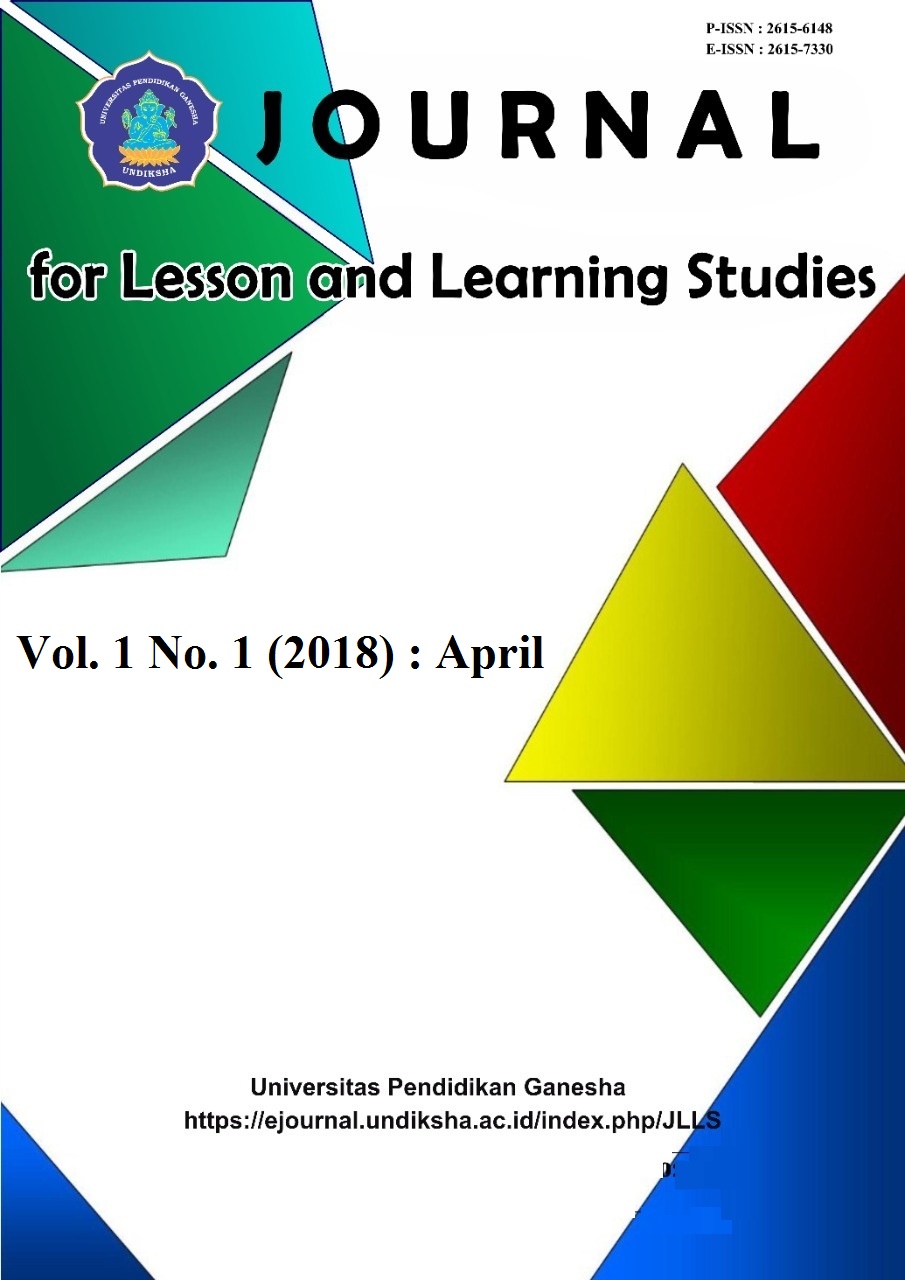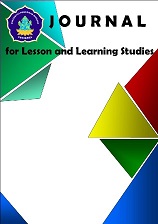PENGARUH MODEL PEMBELAJARAN ROLE PLAYINGBERBANTUAN TEKS DIALOG TERHADAP KOMPETENSI KETERAMPILAN BERBICARA DALAM BAHASA INDONESIA
DOI:
https://doi.org/10.23887/jlls.v1i1.14629Abstrak
This study aims to know significant differences in the competence of speaking skill in Indonesian between groups of students who were taught by role playing learning model aided text dialogue and groups of students who were taught by conventional learning at IV grade Elementary School students of Gugus Budi Utomo academic year of 2017/2018. This research was a quasi experimental design with a non-equivalent post-test only control group design. The population of this research is all IV grade Elementary School students of Gugus Budi Utomo, amounting to 315 students. The sample was determined using group sample technique. The sample in this research is the students of IVB grade Elementary School students 6 Kesiman amounting to 31 students as experimental group and IV grade Elementary School students 14 Kesiman amounting to 38 students as control group.The instrument for collecting data is the scoring rubric. The data obtained were analyzed by t-test. The result of the analysis shows that there is a significant difference of competence of speaking skill in Indonesian between group of students who were taught by role playinglearning model aided text dialogue and groups of students who were taught by conventional learning at IV grade Elementary School students of Gugus Budi Utomo academic year of 2017/2018. This is evidenced by the result = 3,81 > = 2,00 at 5% significance level and dk = 67. The average score competence of speaking skill in Indonesian experimental group = 85,00 >= 76,45 control group. It can be concluded that there is influence of role playing learning model aided text dialogue to competence of speaking skill in Indonesian of IV grade Elementary School students of Gugus Budi Utomo academic year of 2017/2018Referensi
Agung, A. A. Gede. 2014. Buku Ajar Metodologi Penelitian Pendidikan. Malang: Aditya Media Publishing.
Fadhila, Afina Nur, dkk. 2016. “Peningkatan Kompetensi keterampilan berbicara dengan Menggunakan Model Pembelajaran Kooperatif Tipe Time Token”. Jurusan Pendidikan Guru Sekolah Dasar FKIP UNS, (hlm.1-5) (diakses tanggal 10 Januari 2018).
Huda, Miftahul. 2016. Model-model Pengajaran dan Pembelajaran. Yogyakarta: Pustaka Pelajar.
Juliati, Ni Wayan, dkk. 2013. “Pengaruh Pembelajaran Time Token Berbantuan Gambar Berseri terhadap Kompetensi keterampilan berbicara Siswa Kelas V SD Gugus I Gianyar”. Jurusan Pendidikan Guru Sekolah Dasar FIP Undiksha, Volume 2, Nomor 1 (hlm.1-10) (diakses tanggal 10 Januari 2018).Kurniasih, Imas dan Berlin Sani. 2017. Ragam Pengembangan Model Pembelajaran untuk Peningkatan Profesionalitas Guru. Jakarta: Kata Pena.
Komalasari, Kokom. 2011. Pembelajaran Kontekstual Konsep dan Aplikasi. Bandung: PT Refika Aditama.
Kurniasih, Imas dan Berlin Sani. 2017. Ragam Pengembangan Model Pembelajaran untuk Peningkatan Profesionalitas Guru. Jakarta: Kata Pena.Lestari, Novi Elyana dan Wahyu Sukartiningsih. 2015. “Pengaruh Penggunaan Media Komik Tanpa Dialog terhadap Kemampuan Menulis Teks Dialog Siswa Kelas III SD Kecamatan Wiyung Surabaya”. Jurusan Pendidikan Guru Sekolah Dasar FIP UNESA, Volume 3, Nomor 2 (hlm.2077-2086) (diakses tanggal 24 Januari 2018).
Piliang, Yasraf Amir. 2004. “Semiotika Teks: Sebuah Pendekatan Analisis Teks”. Mediator, Volume 5, Nomor 2 (hlm.189-198) (diakses tanggal 23 Januari 2018).
Priyatni, Endah Tri. 2014. Desain Pembelajaran Bahasa Indoesia dalam Kurikulum 2013. Jakarta: Bumi Aksara.
Putri, Mega dan Melia Rahmadona. 2016. “Kemampuan Menulis Teks Biografi Siswa Kelas VIII SMP Negeri 2 Kota Solok”. Bahastra Universitas Mahaputra Muhammad Yamin Solok Sumbar, Volume XXXVI, Nomor 1 (hlm.85-97) (diakses tanggal 23 Januari 2018).
Rusmana, Mulia Ardi. 2013. “Pembelajaran Menulis Teks Dialog dengan Menggunakan Metode Environment learning Pada Siswa Kelas V SDN I Leuwianyar Bandung”. Program Studi Bahasa dan Sastra Indonesia Sekolah Tinggi Keguruan dan Ilmu Pendidikan Siliwangi Bandung (hlm.1-6) (diakses tanggal 18 Januari 2018).Setyosari, Punaji. 2016. Metode Penelitian Pendidikan dan Pengembangan. Jakarta: Prenadamedia Group.
Setyosari, Punaji. 2016. Metode Penelitian Pendidikan dan Pengembangan. Jakarta: Prenadamedia Group.Sugiyono. 2017. Metode Penelitian Kuantitatif, Kualitatif, dan R&D. Bandung: Alfabeta.
Standar Isi untuk Satuan Pendidikan Dasar dan Menengah, 2006. Jakarta: BNSP.
Sugiyono. 2017. Metode Penelitian Kuantitatif, Kualitatif, dan R&D. Bandung: Alfabeta.
Susanto, Ahmad. 2014. Teori Belajar dan Pembelajaran di Sekolah Dasar. Jakarta: PT Interpratama Mandiri.
Wimpiadi, I Kadek, dkk. 2014. “Pengaruh Penerapan Model Pembelajaran Role Playing terhadap Keterampilan Berbicara Bahasa Indonesia Siswa Kelas IV SDN 10 Pemecutan”. Jurusan Pendidikan Guru Sekolah Dasar FIP Undiksha, Volume 2, Nomor 1 (hlm.1-11) (diakses tanggal 13 April 2018).
Unduhan
Diterbitkan
Cara Mengutip
Terbitan
Bagian
Lisensi
Authors who publish with the Journal for Lesson and Learning Studies agree to the following terms:
- Authors retain copyright and grant the journal the right of first publication with the work simultaneously licensed under a Creative Commons Attribution License (CC BY-SA 4.0) that allows others to share the work with an acknowledgment of the work's authorship and initial publication in this journal.
- Authors are able to enter into separate, additional contractual arrangements for the non-exclusive distribution of the journal's published version of the work (e.g., post it to an institutional repository or publish it in a book), with an acknowledgment of its initial publication in this journal.
- Authors are permitted and encouraged to post their work online (e.g., in institutional repositories or on their website) prior to and during the submission process, as it can lead to productive exchanges, as well as earlier and greater citation of published work. (See The Effect of Open Access)





